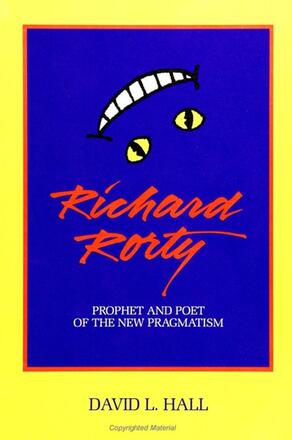
Richard Rorty
Prophet and Poet of the New Pragmatism
Alternative formats available from:
Description
This book is a discussion of the nature and import of Richard Rorty's philosophy, particularly as it relates to his reevaluation of American pragmatism. Rorty's thinking is assessed within the context of both modern and postmodern intellectual trends, and his thought is contrasted with that of his principal contemporaries in America and Europe, including Donald Davidson, W. V. O. Quine, Jürgen Habermas, Michel Foucault, Martin Heidegger, and Jacques Derrida.
David L. Hall is Professor in the Department of Philosophy at the University of Texas at El Paso. He is the author of The Arimaspian Eye; Eros and Irony: A Prelude to Philosophical Anarchism; and co-author with Roger T. Ames of Thinking Through Confucius, all published by SUNY Press.
Reviews
"This is a beautifully written, excellently lucid discussion of Rorty's philosophy. It is written from a position of large sympathy with Rorty's concerns and projects. It exhibits a broad and detailed knowledge both of Rorty's own writings and of those other philosophers in terms of whose work his positions have to be defined and criticized. It does in a way redo Rorty's work more thoroughly and sometimes more carefully than Rorty has done himself.
"Hall provides an insightful reading of Rorty, enabling us, as no one else has done so far, to consider how Rorty's views might be strengthened without abandoning his most important theses. " — Alasdair MacIntyre, University of Notre Dame
"I found the book extremely interesting—enough so that I set aside some pressing tasks in order to finish it. The scope of the author's learning is not only impressive, it contributes to an unusual and especially relevant perspective. The result is a compelling critique, not only of Rorty but also of the most important figures and movements that have influenced him and to which he responds and, in some cases, of other commentators on these. It may seem an odd comment, but I found Hall more interesting than I find Rorty. This book is important as a critical study in the history of ideas and of the culture of philosophy rather than simply as a study of Rorty. " — Beth J. Singer, Brooklyn College, City University of New York
"Against the current backdrop of widespread 'Rorty-bashing' it is a decided pleasure to read an evaluation like Hall's that is so thoroughly familiar with—and able to make sense of—Rorty's complete corpus. This book is written from a knowledgeable, as well as an authoritative perspective. In addition, Hall is such a gifted writer, a master of poetic prose, that the book he writes is a literary marvel worthy of its subject. He often does a better job of explaining and defending certain Rortian insights than does Rorty. He thus qualifies as a 'first-rate' critic, in Rorty's own terms, managing to construct a narrative recontextualization of Rorty's work that will do great service to the critical understanding of this pivotal twentieth–century American philosopher. "— George R. Lucas, Jr. , The National Endowment for the Humanities
"I like the book's depth and range of scholarship, the clarity of expression, its ability simultaneously to attain an interior understanding of Rorty's philosophical authorship and to maintain a critical perspective. The book brings into focus both unexplored connections among various strands of Rorty's writings and unremarked connections between Rorty's project and other contemporary philosophical endeavors. " — Vincent Colapietro